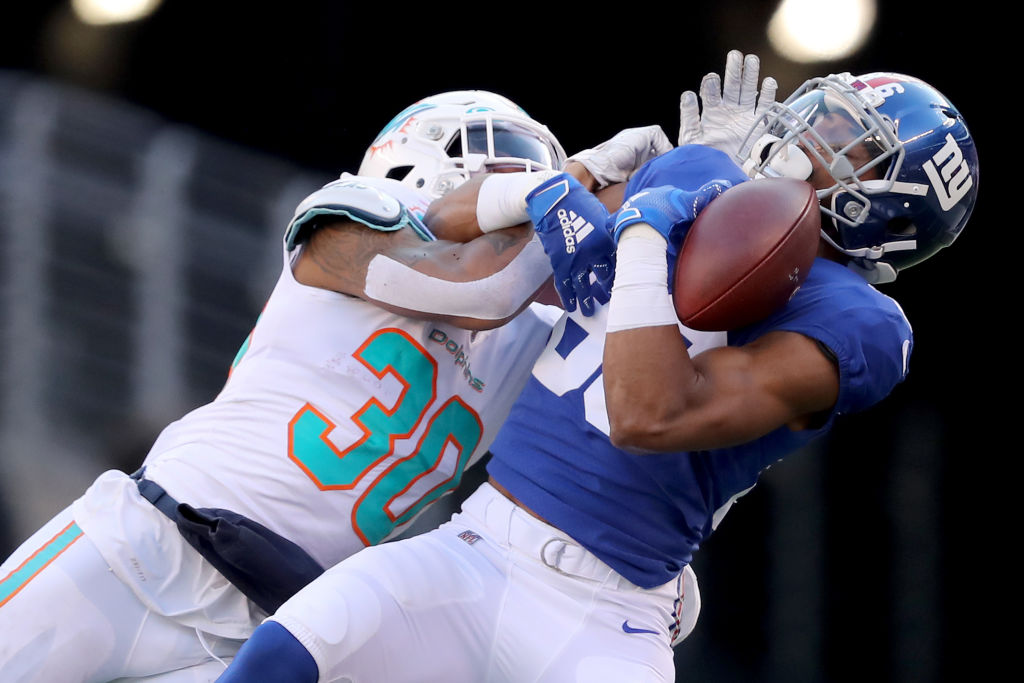NFL
The NFL’s Pass Interference Challenges Could Already Be a Thing of the Past

Every football fan has seen pass interference play out countless times. A receiver comes up short on a catch and throws his hands in the air; after a delay of a few seconds, a penalty flag flies in, and the offense marches down the field. During the 2019 NFL season, however, coaches were able to throw their own flag and challenge the pass interference call. That system rarely changed the ruling on the field.
When the 2020 campaign kicks off, though, coaches might have to keep their red flag tucked away. It’s possible that the pass interference challenge could already be a thing of the past.
The NFL’s history of pass interference problems
After an egregious blown call cost the New Orleans Saints a trip to the Super Bowl, the NFL decided to allow head coaches to challenge pass interference rulings. That decision, however, didn’t work out as anyone intended.
While it’s not hard to imagine a working scenario—a coach throws the challenge flag and the potential pass interference is reviewed like any other play—the NFL chose to complicate matters. “A pass interference ruling will be changed in replay only when there is clear and obvious visual evidence that the on-field ruling was incorrect,” the league explained. “To change the ruling on the field, there must be clear and obvious evidence that contact “significantly hindered” or “did not significantly hinder” an opponent.”
Although that high bar sounds good in concept—no one wants to see a single hand-check result in a game-changing penalty—it proved to be realistic. No one is quite sure what “clear and obvious visual evidence” entails; even if you think the on-field decision is wrong, where is the line between a difference of opinions and an undeniable mistake?
Unsurprisingly, the system didn’t work. Before long, most coaches realized pass interference wasn’t worth challenging. If anything, everyone from players to fans felt the referees’ decisions had become more arbitrary.
The NFL’s competition committee weighs in
When the NFL made pass interference a reviewable call, the decision was only temporary. The 2019 season was a one-year trial; the NFL owners will now have to decide whether it’s worth the hassle to renew the rule on a permanent basis.
The NFL’s competition committee is also weighing their options, but haven’t made a recommendation on axing the rule yet. “I want to wait,” Atlanta Falcons President Rich McKay, who serves as the group’s chairman, told Mark Maske of the Washington Post. “I want to hear everybody out. I am one that votes in the best interests of the game. I think we all saw the frustration that we all had during the year. And I do think it began to get better. But I want to see it all and the total picture and not deal from emotion.”
“You have a subjective standard … and you’re applying it to a subjective play,” McKay continued. “So there’s going to be disagreement. So you have to decide from a cost-benefit analysis standpoint: Is this worth it? Are we getting enough bang for our buck as far as the game goes? And that’s one that the clubs have to answer that question. But I think we should do it and [make] our recommendation after we’ve looked at everything, walked away from it, looked at it one more time and had a lot of discussion about it. I don’t think we should just do it in a knee-jerk first day of watching 111 plays.”
Something has to change with the NFL’s pass interference reviews
When the NFL owners convene for their vote, they’ll have to decide the fate of the pass interference challenge. Even if they decide to make the rule permanent, though, changes are still possible.
“Any time you do a one-year rule, as we did here, you’re always gonna put everything on the table, whether that is passing it as it was, modifying it or voting it out,” McKay explained. “You’re gonna put it all on the table. There may be ideas. There may be things that come out of it: ‘Maybe we shouldn’t look at this. Maybe we should look at that.’ Who knows?”
While that sentiment might sound encouraging, it’s not clear what that change could be, though. There’s been talk of a “sky judge,” who watches the game from a booth and alerts on-field officials of any egregious errors, but the league doesn’t love that idea. The simplest solution would seem to be lowering the “clear and obvious” standard and allow the referees to call what they see but, based on the NFL’s own history, the simple solution rarely works.
The NFL’s pass interference challenge needs to be fixed. If the owners throw the rule in the trash, they’ll solve a short-term problem, but won’t address the root cause.











